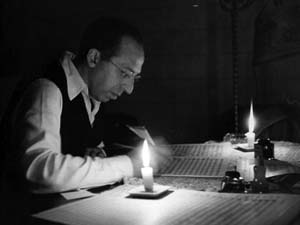|
Audio
Photos
More from MPR
|
 |
| Aaron Copland in his studio in the Berkshires, 1946 (Victor Kraft) |
St. Paul, Minn. — How did it happen that a young man, son of Russian and Polish Jews, reared on the streets of Brooklyn, New York, nearsighted, who never so much as climbed on a horse or brushed the dust off his chaps... how did Aaron Copland come to write music to accompany the balletic adventures of cowboys and desperadoes and pioneer homesteaders?
And, for that matter, to memorialize the words of an Illinois prairie president?
In early 1942, just after Pearl Harbor, the conductor Andre Kostelanetz asked Jerome Kern, Virgil Thomson and Copland each to write a work based on nationally known figures. Together they would comprise a kind of American musical portrait gallery. Kern chose Mark Twain; Thomson, always interesting in his tastes, picked New York Mayor Fiorello LaGuardia and the journalist Dorothy Thompson. Copland chose Walt Whitman. Kostelanetz asked Copland to choose a statesman to balance out the writers, and he decided on Lincoln. Copland himself selected the texts for "Lincoln Portrait." The Cincinnati Symphony performed it first, led by Kostelanetz, on May 14, 1942.
By this time Copland had written "Billy the Kid", was working on "Rodeo" for an October premiere, and would soon compose his ballet for Martha Graham, "Appalachian Spring." Aaron Copland, the one-time avant-garde composer and Parisian sophisticate, was defining an American sound that in turn would come to define him. And he had, as it turns out, a natural claim to a western heritage, and an Illinois connection in particular.
His maternal grandfather, and namesake, Aaron Mittenthal, emigrated to New York with his brother Ephraim, a few years after the Civil War.
The brothers had their sights set beyond New York City. They split up: Ephraim went to Texas, Aaron to Chillicothe, Illinois, about ninety miles north of Lincoln's tomb in Springfield. Aaron sold dry goods off a cart or from a series of small stores, and soon sent for his wife Bertha and their four children, still living near the Polish border in Russia. Aaron Copland's mother Sarah was then six or seven, and she would grow up with farmers and ranchers and cowboys and Indians a natural part of her childhood.
In a few years Aaron and Bertha opened another store in the larger town of Peoria. Soon after, now with six children, Aaron moved the family again, this time to join his brother Ephraim in Dallas. They opened A. & E. Mittenthal, a wholesale and retail dry goods store.
Aaron Mittenthal moved once more in 1881, against the westward tide of emigration, back to New York, where his daughter Sarah met and married Harris Copland. She gave birth to Aaron Copland on November 14, 1900.
Mittenthal foresaw none of that, of course, but what did guide his fateful decision to leave Dallas? He'd enjoyed minor celebrity there, partly because of his faith. His move may have been spurred by a not-so-minor celebrity he hired to work in his store, a real-life desperado. This employee was a draw for the store but it was rumored that the not-yet-reformed outlaw made A. & E. Mittenthal yet another target of his famous gang and made off with the store's profits.
Although it was cut short, the family's western sojourn does help to explain why the West might have been in Aaron Copland's blood. And what other composer could claim that Frank James worked for his grandfather?
Aaron Copland's music will be featured on Open Air with Bill Morelock, Tuesday, November 15.



